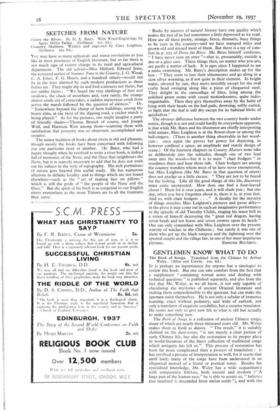SKETCHES FROM NATURE
Y)own the River. By H. E. Bates. With Wood-Engravings by Agnes Miller Parker. (Gollancz. los. 6d.)
country Matters. Written and engraved by Clare Leighton. (Gollancz. los. 6d.)
You may have as many upheavals and minor revolutions as you like in most provinces of English literature, but so far there is not much sign of violent change in its rural and agricultural department. The old school—Miss Mitford, Edward Jesse, the reverend author of Summer Time in the Country, J. G. Wood, C. A. Johns, F. G. Heath, and a hundred others—would not be in the least alarmed by such modern productions as those before me. They might dip in and find sentences not theirs, but not unlike theirs : " We heard the tiny shrillings of bats and swallows, the cluck of moorhens and, very rarely, the strange almost crude cry of corncrakes, a sudden mysterious croak from across the marsh followed by the queerest of silences." Or, " Somewhere beyond the clump of farm buildings, among the heavy elms, at me twist of the dipping road, a cricket match is being played." As for the pictures, one might imagine a party of friendly shades—Thomas Bewick of course, and Joseph Wolf, and Harrison Weir among them—scanning them with satisfaction that posterity was so observant, accomplished and creative.
The minor tradition of books about rivers is old and pleasant, though mostly the books have been concerned with following out one particular river or another. Mr. Bates, who had a happy thought when he resolved to write a river book, is indeed full of memories of the Nene, and the Ouse that neighbours the Nene, but it is scarcely necessary to add that he does not work out his subject in the style of topography. His rich portraiture of nature goes beyond that useful study. He has numerous allusions to definite locality, and to things which are not found elsewhere—such as the " art of making lace on pillows " which is still the pride of " the people of the Nene and the Ouse." But the spirit of his book is as congenial to our English rivers everywhere as the stone Tritons are to all the fountains they serve.
- Books by masters of natural history have one quality which makes the rest of us feel sometimes a little depressed as we read. _Here are all these pretty, strange, fierce, dramatic, busy things to be seen in the country—and we have tramped miles and grown old and missed most of them. But there is a ray of com- fort in p. 125 of Down the River. Mr. Bates himself confesses, " I have never seen an otter "—that is, presumably, outside a zbo or a glass case. These things then, no matter who you are, are partly a matter of luck. It is ages since I happened to see a snake swimming. Mr. Bates's description makes up for the loss : " They seem to lose their sinuousness and go along in a slow silver worming, as if not quite in their element. In bright water, silvered by sun, they move invisibly except for the oval crafty head swinging along like a piece of chequered steel. They delight in the camouflage of lilies, lying among the polished green stems with casual motionlessness, quite indis- tinguishable. Then they give themselves away by the habit of lying with their heads on the leaf-pads, drowsing, softly curled, so light that the leaf is still dry except for its habitual blobs of quicksilver."
The obvious difference between the two country books under notice, though it is not and could hardly be everywhere apparent, is that while Mr. Bates and his illustrator are chiefly interpreting wild nature, Miss Leighton is at the flower-show or among the bell-ringers. (There is another thing observable in her wood- cuts : once again she proves her power for depicting, in however confined a space, an amplitude and stately design of scene.) Of the fourteen chapters in Country Matters none take us deliberately into the solitudes, though one or two lead away into the woods—but it is to meet " chair bodgers " or woodmen there and hear them talk. Chair bodgers are among the country wonders whom most of us have never encountered, but Miss Leighton (like Mr. Bates in that question of otters) does not grudge us a little excuse. " They are not to be found for the looking. Like all the good things of this life, discovery must come unexpected. How does one find a four-leaved clover ? Hunt for it over years, and it will elude you ; but one day, when you have forgotten about it, there it is, at your feet. And so, with chair bodgers . . . " A faculty for the mystery of things enriches Miss Leighton's pictures and prose alike— in the prose it may come out in such an imaginative performance as the episode of old Timothy Childs, ringing his tenor bell in a vision of himself destroying the " great red dragon, having seven heads and ten horns and seven crowns upon its heads." One can only sympathise with Miss Leighton over the present scarcity of witches in the Chilterns ; but surely it was one of them who got up the black tempest and the lightning over the spectral steeple and the village fair, in one of her most impetuous
















































































































 Previous page
Previous page